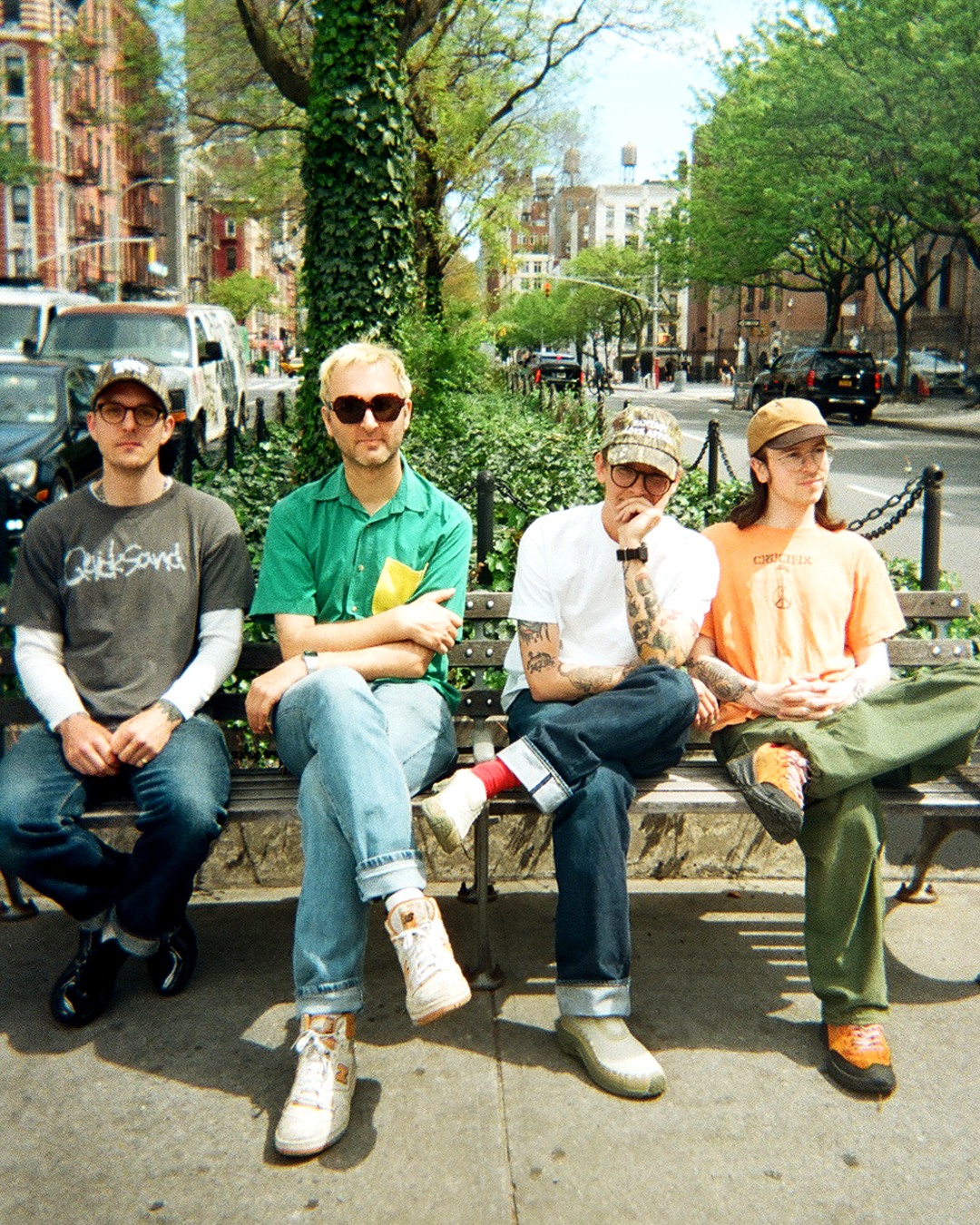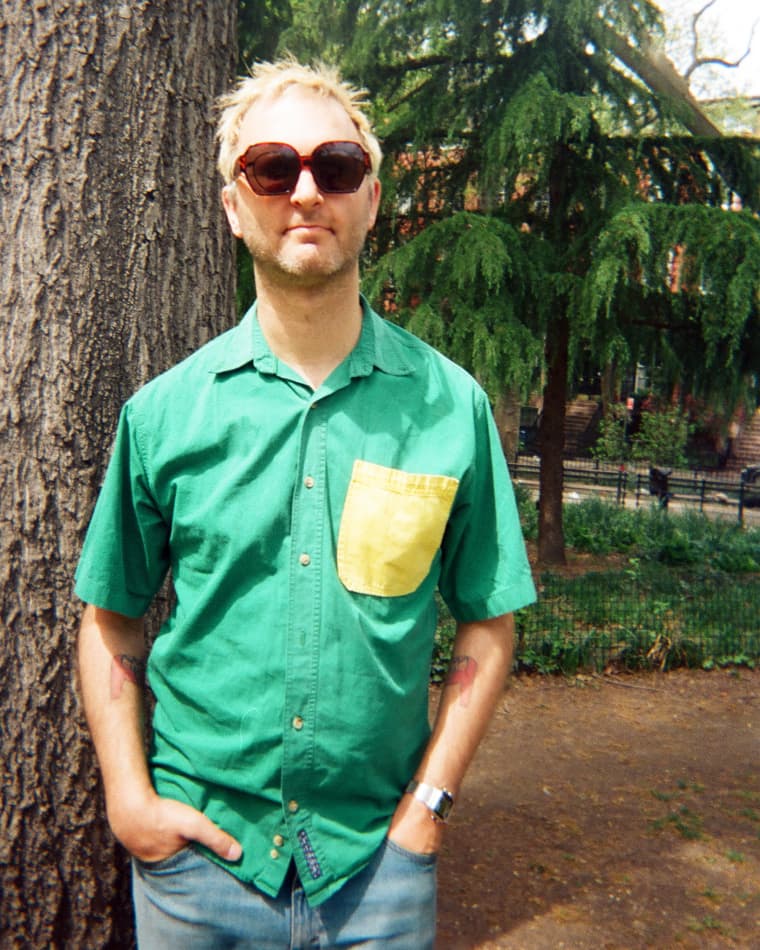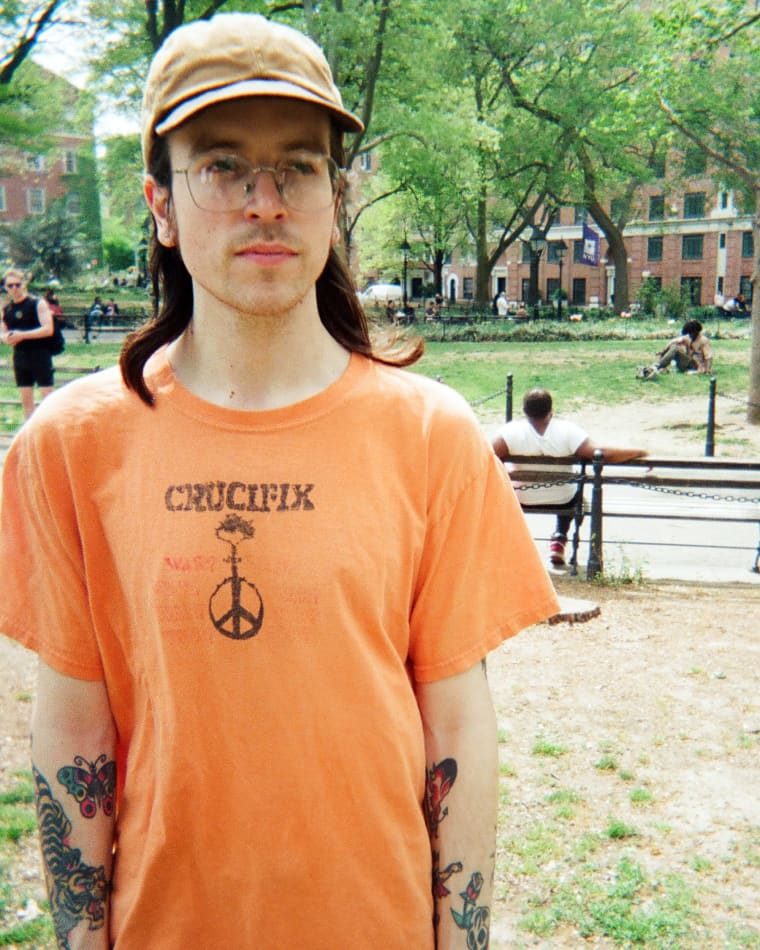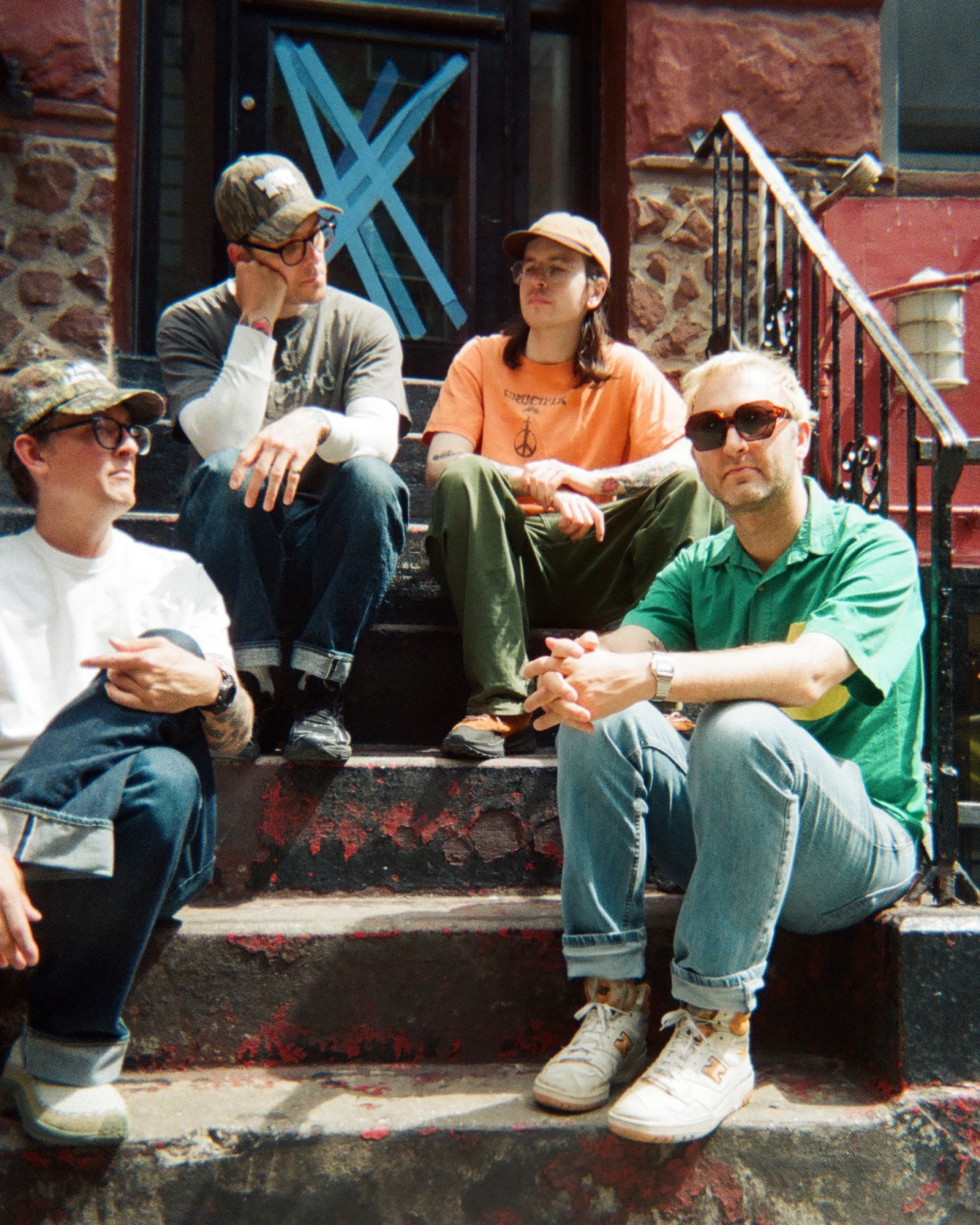 Hotline TNT.
All photos by Cady Siregar
Hotline TNT.
All photos by Cady Siregar
If it’s too loud, you’re too old, goes the saying. “I mean, we are getting old,” Will Anderson of Hotline TNT says. “But I haven’t turned it down yet.”
To be a spectator at a Hotline TNT show is to be so cradled by relentless waves of healing noise. The Ridgewood, New York-based band make lo-fi, shoegaze-adjacent power-pop, but unlike Kevin Shields’ elaborate labyrinth of guitar pedals, TNT stick to a simple, yet winning, formula: fuzz pedals, a tuner, a lot of guitars, and a really good hook. Up until last year, Hotline TNT was just Anderson and anyone who was free to spend several months on tour. But in the lead-up to writing and recording Raspberry Moon, the band’s lush, jangly third album, due for release on June 20 via Third Man Records, Anderson managed to finally seal his band both live and in the studio; it marks the first time that people other than Anderson contributed to writing new Hotline TNT songs. The result is the band’s most realized effort yet, an introspective and bittersweet reflection on endings and beginnings, of fulfilling loves and friendships. On Raspberry Moon, the stars have finally aligned.
“We sort of invited ourselves to the sessions,” bassist Haylen Trammel says when I meet the band for lunch at SoHo’s Hamburger America in mid-April. We’re crammed into a booth with the whole band — Anderson, Trammel, Lucky Hunter (guitar) and Mike Ralston (drums) — a day before they’re due to set out on tour across North America with Hippo Campus. Hunter, who lives in Atlanta and is the only member to not live in New York City, only arrived in town last night. He would call Anderson up with his ideas for the next record only to be told, “Sounds good. For the next record!”
“I had this vision for so long of being like, ‘I’ve done it my way. It’s working. We’re gonna keep doing it this way,’” Anderson says. “But I was also asking myself, why do I have to hold on to that so tightly?”
 Hotline TNT.
Hotline TNT.
Anderson never intended to write and record everything for Hotline TNT by himself. Circumstance just meant that it happened that way. Touring logistics and constantly revolving bandmates made it easier to just do everything alone. But in the lead-up to and aftermath of breakout sophomore album Cartwheel’s release, the band were busier than ever. Anderson had gone from releasing his scuzzy lo-fi 2021 debut, Nineteen In Love, as a YouTube exclusive and running his band website-slash-basketball fanzine, Association Update, to signing with Jack White’s Third Man Records. Hotline TNT were already touring heavily, and needed permanent members who were able to commit to an even more demanding schedule.
Around 2023, ahead of tours with hardcore and alt-rock bands Quicksand and Wednesday, Trammel joined the band to fill in for a bassist who’d dropped out while Ralston, who was already frequently playing with Anderson in Hotline TNT, invited Hunter to support the group. During these first runs, the quartet solidified their live chemistry.
Anderson’s songs morph into a different beast when they are played live; the tempos are faster and the volume louder, as if Teenage Fanclub were refracted into a noisy punk band from Florida. Instead of slapping the shoegaze label on them, it makes more sense to understand the band through their ’90s British rock influences: the yearning of Ride, the lovelorn stadium-sized melodies of Oasis, the jangle-pop of The Jesus and Mary Chain. The enthusiasm of the new band members upped the ante, affirming Hotline TNT’s reputation as a true live force. “The sound engineer will ask us to turn it down, and it’s usually met with some resistance. We just think louder is better, regardless of what the professionals think,” Trammel says.
“We just think louder is better, regardless of what the professionals think.”
But the trust between bandmates was cemented on the road following Cartwheel’s release, through endless days crammed together in the same van. It was here that Anderson would literally road-test new material, working on demos with the band that would become the songs on Raspberry Moon. Each member would add their own flair: a riff there, an extra guitar lick or fill here as they wrote songs like “Julia’s War,” an affectionate nod to friends They Are Gutting a Body of Water and the record label helmed by frontman Doug Dulgarian, and “If Time Flies,” about how being on the road makes the heart grow fonder: “At all the shows / I wanna go and call your phone.” Trammel had a knack for nailing down instrumental transitions, while Ralston acted as a mediator. Playing older songs alongside creating the new allowed the band to constantly grow.
“We’re never really done writing anything,” Hunter says. “I wanna keep the songs evolving so it doesn’t feel stale to us. I think that translates to the people who see us play the same songs over and over.”
 Will Anderson.
Will Anderson.
 Lucky Hunter.
Lucky Hunter.
In the summer of 2024, before they were due to record Raspberry Moon, the band were on tour across Europe and disaster struck. While playing OFF Festival in Katowice, Poland, Hunter took a bad fall onstage and dislocated his knee, breaking his kneecap and bruising his femur bone in the process.
“Realistically, I probably should’ve gone home,” Hunter admits. “At 33, that’s a pretty life-changing injury that I think about every day, and every time I get on stage and play.”
But Hunter was firmly committed to finishing the tour, his leg fitted in a brace and forced to play guitar atop a stool onstage. The band breathed a small sigh of relief and it was a chance to trauma-bond. If this wasn’t the ultimate display of unwavering dedication to Hotline TNT, what was?
Being stuck in the same refrigerator-sized vehicle for boundless hours will inevitably cause friction, but the band learned how to work around it, and through it. Now, they have weekly check-ins, where they talk about their feelings and mental states. “It really is so much like a romantic relationship. Like, ‘You know I love you so much, but you’re annoying me more than anyone’s ever annoyed me, and that’s OK,’” Anderson says. “We’re gonna eventually get past it. I’m still gonna love you.”
 Mike Ralston.
Mike Ralston.
 Haylen Trammel.
Haylen Trammel.
“It really is so much like a romantic relationship. Like, ‘You know I love you so much, but you’re annoying me more than anyone’s ever annoyed me, and that’s OK.’”
Some of the tension spilled into the studio sessions for Raspberry Moon in Wisconsin, where the band worked with DIY punk producer Amos Pitsch. The band blocked out some time to record around their tour schedule, and the intention was for the band to play on Anderson’s existing demos — already a first for the band. But the trio weren’t content with being session musicians and had ideas of their own. It wasn’t easy for Anderson to relinquish control. Hunter flat-out refused to play a version of “Dance the Night Away” that was originally intended to be way faster, and pop-punk. “I don’t know if it was so much like a question of if I felt like I could push back, as much as that I just can’t help myself,” Hunter says.
With the band’s feedback, it evolved into a sweet, rockier ballad (“More like Goo Goo Dolls’ A Boy Named Goo”). A loving tribute to Anderson’s girlfriend, it’s one of a handful of love songs on the record alongside “Candle” and its heartfelt lines amid crushing guitars: “They don’t hold a candle to you.” The sulkier, experimental “Break Right” was written when the band had reached an impasse regarding the structure of one demo that didn’t end up making the record. Hunter, Ralston, and Trammel started jamming out a new song on their own, a moodier tune that matched the atmosphere of the room. While tracking the drums to “Break Right,” Anderson wrote the angsty, intense “The Scene.” It was a one-two punch for the band.

“There’s no other Hotline song than ‘Break Right’ that speaks to the expanding nature of this group,” Anderson says. “That and ‘The Scene’ are two songs that wouldn’t exist without these four people. It’s not Will writing ballads anymore.”
On one such ballad, “Was I Wrong?,” Anderson reflects on the end of a relationship, questioning if his own perception ultimately clouded his judgment. After consistent disappointment and heartbreak, it’s easy to become jaded and distrusting. But you might be surprised; you never know if someone you meet might end up taking a bullet for you. Or just dislocate their knee onstage playing a song that you wrote.